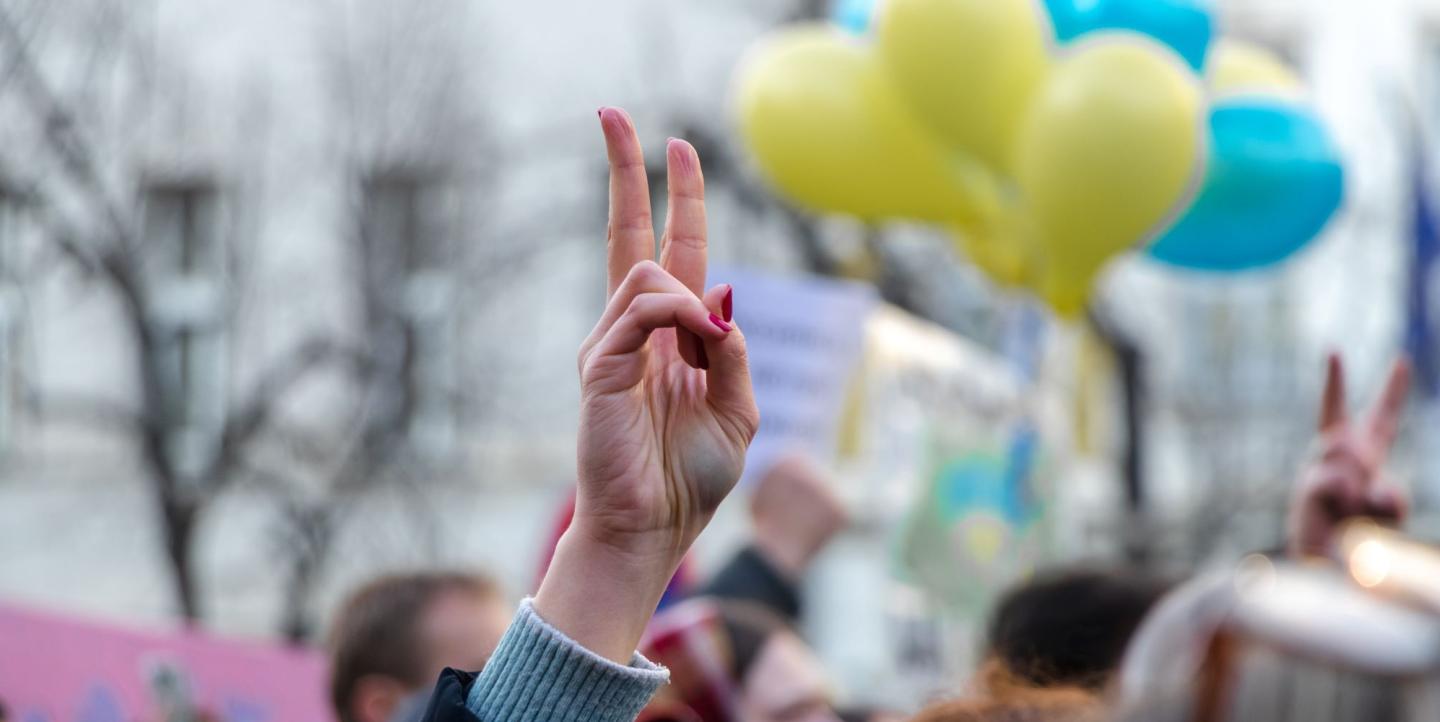As Russia’s invasion of Ukraine rages on, state media in the country is trying its best to justify the aggression. Meanwhile, Russians are leaving their country. How many are doing so? Why are they leaving and when will they return, if ever? What do they think of Russia's war on Ukraine? Not much has been written about it.
In an effort to document what she calls a “fractured reality” today, Linor Goralik launched Exodus 22 from Tbilisi, Georgia, for which she collects and publishes the stories of those who have fled Russia for nearby countries such as Georgia, Armenia, Turkey and Israel. Goralik publishes these accounts as collections of short stories; three collections exist today with a fourth on its way.
"Before I went to each new location, I wrote on Facebook that I was doing this project, that I wanted to speak with recent immigrants from Russia, and that I would be especially grateful to meet those who help others," Goralik told IJNet. "I spent about a week in each country where I talked to about 50-60 people in each country, in long meetings and short conversations alike. I had five or six long face-to-face meetings a day, including with several people at once, conversations in cafes, interactions at events, and so on."
The short story collections format is ideal for the accounts Goralik has gathered, she explained. "I think this best suits the confused state in which, as far as I can tell, many of my interviewees are in, and the fractured reality in which we find ourselves," said Goralik. "People are afraid it's going to get even more frightening."
I spoke with Goralik to learn more about Exodus 22 and her other war-themed media initiatives, such as ROAR.
Exodus 22
Hanna Valynets: You don't give the names of your interview subjects. Why not?
Linor Goralik: There are three reasons. One, it's important to me that people have an opportunity to speak openly. Second, to avoid unpleasant discussions later about who said what. And third, I want to protect them from attacks by pro-government trolls.
After each new batch of stories, there was a storm of pro-government articles — I don't know how to describe it in decent words — calling my subjects "the shit of the nation," at the very least. The last thing I want is for those who write such things to harass my interviewees on social media.
What are people running from?
Everyone has different reasons, but many are fleeing for the following three reasons: First, they don’t want to live in the country that unleashed this monstrous war and repression. Second, the repression itself. Third, they feel that an even greater terror is about to begin — perhaps it could be called the "Second Great Terror." I've met people who have been taken to the police station for a tweet or a Facebook comment.
Is the Great Terror a reference to Stalin and 1937?
Yes, of course. Many — and I am the same — are afraid that the crackdowns against those who oppose the war and the regime will become even more terrible than they are now.
Can you describe in more detail how your interview subjects are feeling?
The last thing I want to do is to fall into generalizations because that is one of the mistakes often made by those who are trying to analyze this new migration from Russia. All people are individuals. But many of the people I interviewed, it seemed to me, were confused, many experienced grave emotions about what was happening in Ukraine and Russia, and a great many had every reason to fear the future.
I fear for them because many who left may not be able to stay abroad, let alone obtain another citizenship. I'm scared because a number of those who have left will obviously have a difficult time making a living, and a great many have now lost their jobs. Many of them do not intend to return under the current regime. My interviewees more than once admitted that they found themselves in a state of limbo. I am very worried about them.
ROAR, a second war-themed initiative
Goralik's second war-themed project is called ROAR, short for “Russian Oppositional Arts Review.” Run by about 70 volunteers, the publication opposes "the loyal, servile, official culture that merges in its extreme form with propaganda and serves the current criminal Russian government," Goralik said in a recent interview.
ROAR published its first issue, focused on the Russian invasion of Ukraine, in late April. The following day the website experienced a DDoS attack. Unlike Exodus 22, many of the publication’s interview subjects have refused anonymity, even though they remain in Russia.
ROAR’s second issue, like its first, will be available in Russian, English and French. The translation of the first issue into Italian is underway.
Valynets: It seems to me that not enough is written about Russians who oppose the country’s war on Ukraine. How well do you think their position is represented in the public space?
Goralik: One of the reasons we created ROAR was to show that there are Russians who oppose the regime, and are not afraid to talk about it. We can not be sure that these voices will be heard. But we believe it is essential that our authors can publish their poetry, music and artwork.
The theme of ROAR's second issue is "Resisting Violence." The most significant topic for us, of course, is still Russia's war against Ukraine, but we want the authors to have an opportunity to speak about repression in Russia, too, and about the experience of private resistance to violence against individuals. These are related concepts in Russian culture: violence against the individual begins with the regime, and culminates in the violence of one country against another one.
We now have an extensive portfolio for the second issue, with a significant poetry selection (almost 50 pieces), an art selection (more than 30 pieces), and we're finalizing an audio selection. We have, as far as we can tell, a very strong collection of essays and prose.
Could you articulate a few of the main ideas that the authors are trying to convey through their work?
I think one of the very important ideas is not just "No to War," but the idea of individual responsibility for private actions, in a historical context.
Additional war-themed projects
Goralik is working on several other projects related to the Russian invasion of Ukraine, all of which aim to use individual voices to preserve a picture of what is happening today.
“I think personal experiences are extremely important compared to official narratives,” said Goralik. “I strongly believe that an era is learned first and foremost through the personal stories of the individuals who lived through it, and I try to make the tiniest contribution I can to the preservation of those stories.”
Valynets: Do you have a favorite story?
Goralik: I have a favorite theme: there are many stories about parents unhappy with their children who have sought to emigrate. But there is a small category of stories about parents who have been incredibly supportive of their children's desire to leave Russia and did everything they could to help them, including scraping together the last of their money.
What do you like about those stories?
That staying together doesn't mean being together in a geographic sense. There is a much more meaningful "together," which is about support, understanding, and sharing common values — caring for each other. These are very inspiring stories.
What is necessary for an outside observer to know about people from Russia?
First, they are all different: I think generalization is the way to lose any understanding when it comes to people. Second, I think it's crucial to understand how many people in Russia right now hate the current regime, the war and the government. People who feel genuinely unbearably bad about what is happening, and who are not just worried about it but are doing everything in their power to change the situation.
It may seem like a drop in the sea. but it can clean the sea. Activism, informing skeptics, mutual support, and creativity: I believe this is where the downfall of oppressive regimes begins.
This article was originally published in Russian and translated into English.
Photo by Jakub Ivanov on Unsplash.


